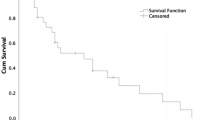Abstract
Somatostatin analogues can suppress the secretion of some gastrointestinal hormones and growth factors involved in the growth regulation of gastrointestinal cancers and can inhibit the growth of experimental pancreatic tumours. Therefore, in a phase II study 34 patients with metastatic pancreatic (n = 14), colorectal (n = 16) and gastric cancer (n = 4) were treated with three daily subcutaneous injections of 100-200 micrograms of the somatostatin analogue Sandostatin (SMS 201-995). All patients had an extensive tumour load and 13 were pretreated with chemotherapy. Before Sandostatin treatment the patients with pancreatic cancer showed a higher mean plasma concentration of GH (P less than 0.05) and a lower concentration of 'total' somatomedin-C (P less than 0.005) compared with patients with colorectal cancer; there was no significant difference between these two groups in plasma levels of directly assayable somatomedin-C, EGF/TGF-alpha, insulin and prolactin. Within 3 days after start of treatment, somatomedin-C levels initially decreased (without a change in basal plasma GH levels), but returned to pretreatment levels within 4-13 weeks. Plasma insulin levels also were suppressed but only during the first 3-5 days of treatment. Plasma EGF-TGF-alpha levels increased significantly at day 5 of treatment only in the pancreatic cancer patients. Twenty-seven per cent of the patients showed stable disease for 3-9 months, but most patients experienced subjective improvement in the absence of serious side-effects. However, the overall survival remained disappointing, emphasising the need for better treatment regimens.
This is a preview of subscription content, access via your institution
Access options
Subscribe to this journal
Receive 24 print issues and online access
$259.00 per year
only $10.79 per issue
Buy this article
- Purchase on Springer Link
- Instant access to full article PDF
Prices may be subject to local taxes which are calculated during checkout
Similar content being viewed by others
Author information
Authors and Affiliations
Rights and permissions
About this article
Cite this article
Klijn, J., Hoff, A., Planting, A. et al. Treatment of patients with metastatic pancreatic and gastrointestinal tumours with the somatostatin analogue Sandostatin: a phase II study including endocrine effects. Br J Cancer 62, 627–630 (1990). https://doi.org/10.1038/bjc.1990.343
Issue Date:
DOI: https://doi.org/10.1038/bjc.1990.343
This article is cited by
-
Somatostatin and chemokine CXCR4 receptor expression in pancreatic adenocarcinoma relative to pancreatic neuroendocrine tumours
Journal of Cancer Research and Clinical Oncology (2019)
-
Somatostatin analogues in the treatment of gastroenteropancreatic neuroendocrine tumours, current aspects and new perspectives
Journal of Experimental & Clinical Cancer Research (2010)
-
Treatment of advanced pancreatic cancer with the long-acting somatostatin analogue lanreotide: in vitro and in vivo results
British Journal of Cancer (1999)
-
Gastrointestinal hormones as potential adjuvant treatment of exocrine pancreatic adenocarcinoma
International journal of pancreatology (1998)
-
Octreotide combined with goserelin in the therapy of advanced pancreatic cancer-results of a pilot study and review of the literature
Journal of Cancer Research and Clinical Oncology (1997)



